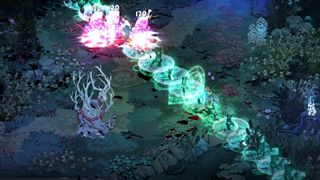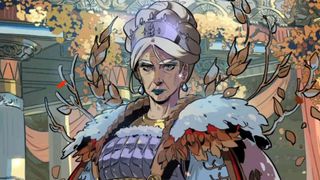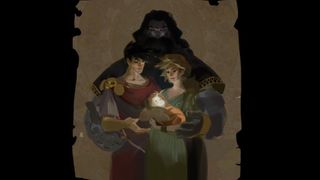
Something new happened to me when I started to play Hades 2. From a janky beginning, I could feel the muscle memory returning to my fingers with every trepidatious step I took through the highly anticipated sequel to one of the best roguelikes in recent memory. And while the first Hades 2 technical test demonstrates that there's more than enough here to justify a full-fledged sequel from developer Supergiant Games, the footsteps of new protagonist Melinoë fit firmly within those of her predecessor, Zagreus.
Unfortunately, Zagreus is nowhere to be found. Melinoë's older brother is missing, along with her mother, Persephone, and father Hades. Their place in Hades' halls has been taken up by the Titan Chronos, and with the help of Hecate, goddess of magic, Melinoë plans to take it back. Although that may be easier said than done.Trained by Hecate almost from birth, it's clear that this new protagonist has the skills, but not necessarily the confidence, to take on the Titan of Time.
Melinoë's movements and attacks are clearly styled very closely after Zagreus, the same feeling of nipping at the heels of enemies is here – the cycle of dashing in and out to harry foes with a quick barrage of blows before getting out of harm's way is firmly built in to the structure of Hades 2. I've not played much of the original Hades since its full release in 2020, but the gentle feeling of familiarity that overcame me as I got to grips with Melinoë was extremely comforting.
Keep it in the family

Of course, there's plenty to set Melinoë apart from her older brother. From the very start, she has none of Zagreus' signature swagger, the righteous confidence in his crusade. Melinoë is a character only just starting out on her journey, and her crusade is much more about overcoming a genuine injustice than the perceived slights that Zagreus rails against at the start of the original Hades. There's an uncertainty to the moves she makes, an awkward performativity that nestles perfectly within the narrative that Supergiant has spun, but makes sure that Melinoë is no carbon copy.
If anything, however, it becomes clear that the potential of this new protagonist is far beyond that of her brother. There are far more tricks up Melinoë's sleeve, a huge amount of extra versatility in combat. The divine Boons, the Poms of Power, and the Deadalic Hammers all return from the first game to give each run its own feel, but Melinoë also has her own tools. A relatively weak ranged attack augments one of Zagreus' abilities, but a limited area of effect nova offers the extra ability to make some space when enemies close in.
All of Melinoë's attacks can be augmented too, if you can find the time to commit to them – holding down any of her attack inputs casts a far more powerful spell, a pool of mana limiting their uses on a given run. For now, the charge time on these spells leans just a moment too long for me – something I hope is addressed by the time Hades 2 moves into Early Access in the summer months – but these are powerful, versatile moves that boons can help craft an entire build around, and you can feel how the skill expression will manifest from them on longer runs.
Goddess of Lite

Matched with Melinoë's relative naivety are the roots of a far more expansive roguelite progression system than Zagreus' mirror. A variety of weapons and Supergiant's signature, slow-burn narrative stylings both return, but Hades 2 now offers resource gathering, simple crafting systems, and trading. The mirror that allowed Zagreus to change up his skills is no more, but Melinoë relies instead on a tarot-like system that better reflects her more magical background.
Sign up to the GamesRadar+ Newsletter
Weekly digests, tales from the communities you love, and more
Woven between each run is a far more deliberate, confidently-trodden story than Hades offered. That original story is filled with Supergiant's narrative skill, of course, but it often felt as though it was somewhat obscured behind each run, as though gameplay had to speak louder than story. In Hades 2, Melinoë is instantly louder and more present in her own narrative than Zagreus was, the web of relationships she's drawn with the characters around her far more deliberately personal and involved from the very start.
That even extends to the Gods of Olympus. Still absent due to a stalemate imposed by their own conflict with Chronos, Melinoë's various aunts, uncles, and cousins still deign to help her in her quest. New arrivals, like Apollo and Hestia, ensure that we're not simply seeing the same ideas as before, while other mythological characters, like Arachne, help further fill out Melinoë's world.

With art even more gorgeous than before, and an array of new ideas woven into the new and returning cast, it's clear within just a couple of runs that Hades 2 is a more expansive sequel at almost every turn. Immediately just as confident in itself as its predecessor felt at the height of its powers, Hades 2 has the potential to improve over the original game in every facet of its being. Already, at this earliest stage of its journey to release, it's a more substantial take on this world, a more confident exploration of combat, and a more deliberate attempt to alter what both a roguelike and a Supergiant game can be.
The roguelike genre has moved on considerably since Zagreus first stepped out of his pool in 2018. So while Hades 2 is no longer the unique prospect that its predecessor once felt like, in its doubling down on all the places that made Hades so special it's already clear to me that this is the next roguelike hit – it's just merely waiting to be crowned.
Hades 2 is expected to launch into Early Access on PC in the coming weeks. If you want to give it a try for yourself, check out our guide on how to join the Hades 2 technical test.

I'm GamesRadar's news editor, working with the team to deliver breaking news from across the industry. I started my journalistic career while getting my degree in English Literature at the University of Warwick, where I also worked as Games Editor on the student newspaper, The Boar. Since then, I've run the news sections at PCGamesN and Kotaku UK, and also regularly contributed to PC Gamer. As you might be able to tell, PC is my platform of choice, so you can regularly find me playing League of Legends or Steam's latest indie hit.
Most Popular

